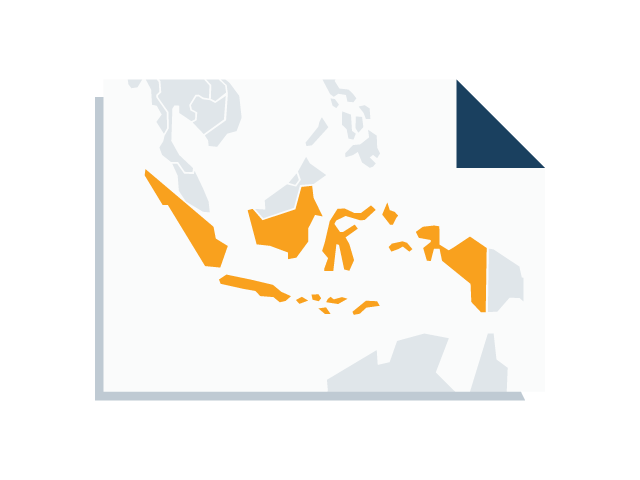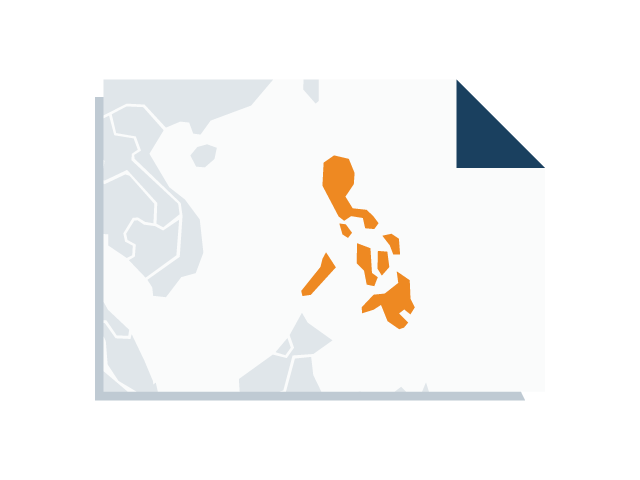AVERAGE SCORE
46READINESS AVERAGE
59IMPLEMENTATION AVG
39IMPACT AVERAGE
47This regional snapshot analyses the 12 East Asia and the Pacific countries assessed in the fourth edition of the Barometer.
General regional highlights and findings
Countries in the region continue to challenge early open data leaders for top spots, with four countries now ranking in the top 10. South Korea is the top performing country in the region — 5th in the global rankings — while the Philippines leads the lower middle-income countries, ranking 22nd.
But in line with the global trend, progress on open data implementation remains slow. Only 7% of datasets analysed in the region were open, and key datasets that can be used by citizens to hold governments to account — like contracts, companies and spending data — remain closed. Indeed, spending data was the least open dataset in the region.
Regional Ranking
| Global Rank | Score | Country | Readiness | Implementation | Impact |
|---|---|---|---|---|---|
| 5 | 81 |
 Korea
Korea
|
95 | 59 | 100 |
| 5 | 81 |
 Australia
Australia
|
85 | 78 | 78 |
| 7 | 79 |
 New Zealand
New Zealand
|
92 | 58 | 99 |
| 8 | 75 |
 Japan
Japan
|
84 | 60 | 89 |
| 22 | 55 |
 Philippines
Philippines
|
58 | 41 | 76 |
| 23 | 53 |
 Singapore
Singapore
|
73 | 46 | 41 |
| 38 | 38 |
 Indonesia
Indonesia
|
51 | 39 | 25 |
| 53 | 28 |
 Malaysia
Malaysia
|
53 | 20 | 19 |
| 53 | 28 |
 Thailand
Thailand
|
40 | 31 | 11 |
| 71 | 20 |
 China
China
|
46 | 10 | 11 |
| 79 | 17 |
 Vietnam
Vietnam
|
25 | 18 | 13 |
| 113 | 1 |
 Myanmar
Myanmar
|
2 | 5 | 4 |
Open Data Barometer 4th edition - Regional ranking
How’s the region performing against the rest of the world?
Readiness
Civil society engagement remains strong - even in countries with a weak history of civil society participation such as Malaysia and Singapore.
Readiness of the private sector to take advantage of open data remains stagnant even though government support for innovation is increasing.
Implementation
Publication of innovation datasets is improving with high-income countries in the region leading the way in using data to drive economic growth.
While budget data is accessible in most countries, contracting and spending data remains closed.
Impact
There is increasing evidence that open data is improving government efficiency, both in high-income and in low/middle-income countries.
Open data impact has not yet translated into concrete improvements in the lives of ordinary people, especially for traditionally marginalised groups.
Country Profiles

Indonesia ranks 38th out of 115 countries in the fourth edition of the Barometer. The country continues to improve its readiness to implement open data policies. Government collaboration with civil society on projects fostering innovation — such as Hackathon Merdeka and Compfest — shows promising support for open data at regional and national levels. However, there remains a lack of progress in the implementation and visible impact of open data in the country.

Philippines leads among lower middle-income countries in overall openness, ranking 22nd of 115 countries. While Freedom of Information laws have not been enacted, open data is required to be published by agencies through annual budget legislation. Several new initiatives have capitalised on this data — with impressive results. These include Bottom-Up Budgeting, Open Reconstruction and Project NOAH, projects that seek to make budgeting and planning inclusive, bring greater scrutiny to donor and government projects, and improve capacity for disaster-preparedness.

